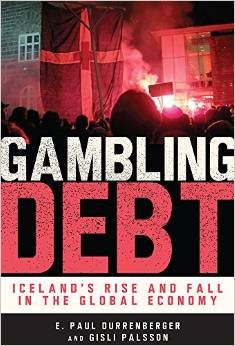PhD fellow, James Maguire, recently had a chapter published in the book ‘Gambling Debt: Iceland’s Rise and Fall in the Global Economy’. Following is his introduction to this chapter.
In the decade preceding the financial crisis of 2008, the Icelandic economy became thoroughly immersed within the global currents of transnational capital. Being hailed as the new financial Mecca of Northern Europe, the economy was marked by a glut of cheap credit and escalating private debt. However, despite a series of international warnings highlighting the banking sector’s overly leveraged position and the relative inability of such a small island state to underwrite such debts, the situation came to a head in October 2008 with the collapse of the country’s three main banks and a subsequent International Monetary Fund (IMF) intervention. Like the proverbial canary in the coalmine, Iceland’s financial crisis presaged what was to follow in other European countries, as the complexities and consequences of new ‘financial economies’ continue to unfold.
During the pre-crisis period the fishing industry, along with the banking and energy sectors, became bound up within a constellation of neo liberal policies and practices in which the rush to privatization became the dominant motif. Historically, fish have been both an economic fundament and a source of socio-political tension in Iceland, and the recent crisis has only exacerbated these tendencies. Fish have been central actants in the development of regional communities over the last one hundred and fifty years in which towns have come and gone relative to the presence or absence of these aquatic resources.
This traditional relationship, whereby the destiny of people and towns is tightly aligned with the movement of fish in nearby waters, has seen a subtle transformation over the last two decades. Instead of following fleshy fish swimming in nearby seas, people have ever increasingly been following virtual fish; ones that have been taken out of the sea and brought to life in exchanges and electronic marketplaces and upon which extraordinary sums of money can and have been raised.
Based on ethnographic fieldwork carried out in the West Fjords of Iceland in 2010, this paper shows how the virtual fish emerged at a particular conjuncture in the life of the Icelandic nation, one in which the processes and practices of a new ‘financial economy’ were underway.
However, while the emergence of such a fish cannot be pinned down to a specific causal trajectory, I argue that the practices of fisheries science, fisheries legislation and finance capital intersected with, or were enfolded into, one another in such a way as to enable the virtual fish to continue to sustain itself. In leaving the seas, the virtual fish entered the lives of Icelanders at a spatio-temporal scale very much different to that of the ordinary fleshy fish. Although neither fish (virtual and fleshy) makes a greater ontological claim, they both have, as I will show, different ‘modes of existence’.
Read the blurb of the book here
